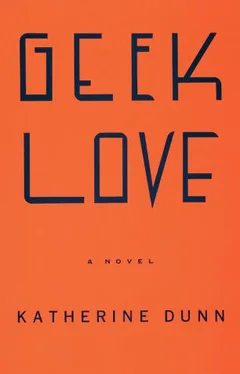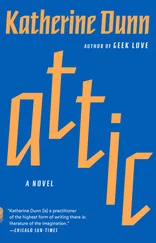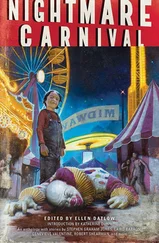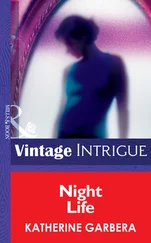The body of the trunk is crammed with clipping books, thick stacks of paper wrapped in black plastic. Photographs. Sound tapes. A tight roll of posters held by dry and brittle rubber bands.
This fragile, flammable heap is all that’s left of my life. It is the history of Miranda’s source. She soars and stomps and burns through her days with no notion of the causes that formed her. She imagines herself isolated and unique. She is unaware that she is part of, and the product of, forces assembled before she was born.
She can be flip about her tail. Or she can try. She is ignorant of its meaning and oblivious to its value. But something in her blood aches, warning her.
I slip the topmost poster from the roll. The paper is stiff, wanting to break rather than tear. Carefully spreading it, uncoiling it, sliding plastic-wrapped bundles onto the corners to hold it down, I open it on the musty carpet.
The Binewskis are revealed, dressed in glittering white, enchanted against sea greens and blues, smiling, together still on wide paper. The poster has a fountain format with the whole family spewing upward from Chick, during his brief “Fortunato — The Strongest Child in the World” period. Papa killed this poster, along with Chick’s act, before the public saw either of them. But it is my favorite family portrait. Chick, six years old and golden, is smiling at the bottom, his arms straight up with his parents standing on his hands. The beauteous “Crystal Lily” in an openly amorous pose, one leg kicking high out of her dance skirt, wrapped in the arms of the handsome “Ring Master Al,” our Papa, Aloysius, in high boots and chalk jodhpurs — their smiles leaping upward in yellow light toward our stars, our treasures—“Arturo the Amazing Aqua Boy,” afloat with his flippers spread angelically in hinted liquid in the upper right corner, his bare skull gleaming and haloed. In the left corner, at a cunningly suggested keyboard swirling out of the blue, “The Magnificent Musical Siamese Twins, Electra and Iphigenia!” Elly and Iphy with their long hair smoothed into black buns, slim white arms entwined, pale faces beaming out in shafts from their violet eyes.
And I am there also. “Albino Olympia,” viewed from the side to display my hump, bald nobbly head tilted charmingly, curtsying with one arm pointing at the glorious Chick and his miraculous burden. Chick was six and I was twelve but he loomed a full head taller. The arched banner across the top in joyous glitter, “The Fabulous Binewskis.”
The wallet-sized school picture from Miranda’s senior year shows her face the same size as the Binewski poster faces. I slide the photo around, next to Chick, to Arty, to Papa Al. It is Arty she looks like. Those Binewski cheekbones and the Mongol eyes. Would she see it?
BOOK II. Your Dragon — Care, Feeding, and Identifying Fewmets
The Olympia McGurk profile in the personnel computer of Radio KBNK lists my training as “Elocution and diction, and microphonic presentation as taught by Aloysius Binewski,” which I wrote calmly and confidently into my résumé as though every well-trained voice would recognize the name of the master.
That was Papa, sitting in the back of the tent at the soundboard, wearing headphones and glaring at me as I stood on one foot on the stage with the old ragged microphone waving aimlessly near my mouth. Papa, hollering, “Boring!” at my fiftieth delivery of “Step right this way, folks!” or mimicking cruelly, “Ya-ta, ya-ta, ya-ta!” if I fell into a repetitive rhythm on “From the darkest mysteries of science, a revelation of poetic grace.”
“Move your lips, for shit’s sake!” howled Papa, or “Stop with the mouse farts and project!
“That’s a double-reed instrument! It is called a voice! It is not a comb wrapped in waxed paper! I gave it to you from the love in my guts for your scrawny and unmarketable carcass, so be kind enough to use it properly!”
And me all the while having to pee — coughing into the mike when my throat was tired and raw — eyes stinging and lips and chin crumpling in grief at his anger. The sweet tinkle of Electra on the bass and Iphy on the treble with Mama’s voice counting, “One and two and …” as the twins had their piano lesson inside the trailer. The gurgle and hum of the pumps that filtered my brother Arty’s “Aqua Boy” tank. And the dim round moon of baby Fortunato’s face peering at me from the dark of the risers above Papa.
If I finally did it right and got all the way through from “Step up, friends” to “A vision of the miraculous extravagance of Nature for the same simple price as an overcooked hotdog” without a single bellow of rage from my beloved papa, then he would swoop me up in huge arms and tuck me onto a shoulder, where I could grab his astounding hair in my fists and ride high through the tent flaps into the light, with Fortunato’s golden head chugging along far below, and we would parade the long street of booths with me laughing down at the red-haired girls who sold the candy and at the toothless wheelman and Horst the Cat Man all nodding at Papa’s instructions, and hearing, feeling his huge voice rumble out from beneath my legs, “This little beetle did her lessons just right today.”
It’s funny, in a dingy way, that I make my little living by reading. I have to smile because I used to avoid reading. It scared me.
It never bothered Arty. He read constantly — anything — but his favorites were ghost stories and horror tales.
When we were still children I was the one who turned his pages. He’d lie in bed reading late when everyone else was asleep. I lay beside him and held his lamp and turned the pages and watched his eyes move in quick jerks down the print. Reading was never a quiet pastime for Arty. He rocked, grunted, muttered, and exclaimed. He was in one of his toilet phases at that time. “Sweet rosy-brown arsehole” was his expression of pleasure. “Shitsucker” was the pejorative.
“Don’t you get dreams?” I asked him. “Don’t you get scared reading those at night? They’re supposed to scare you.”
“Hey, nit squat! These are written by norms to scare norms. And do you know what the monsters and demons and rancid spirits are? Us, that’s what. You and me. We are the things that come to the norms in nightmares. The thing that lurks in the bell tower and bites out the throats of the choirboys — that’s you, Oly. And the thing in the closet that makes the babies scream in the dark before it sucks their last breath — that’s me. And the rustling in the brush and the strange piping cries that chill the spine on a deserted road at twilight — that’s the twins singing practice scales while they look for berries.
“Don’t shake your head at me! These books teach me a lot. They don’t scare me because they’re about me. Turn the page.”
• • •
Maybe it’s mean to think, but the best time was before Chick was born. Things were simple. Papa would tell us about the hard times and explain that Arty had brought success to the show, and that Elly and Iphy had helped the business and, because he was a kind man, that even Oly had “done her part.” There was always work but it was good.
Mornings were our time. After lessons and before the stage shows began at 2 P.M. we were free creatures. Papa connected two chunks of tire tread with a nylon web, and attached web straps to fit over Arty’s fore and aft fins. With this rubber-tread armor on his chest and belly, Arty could slither almost anywhere.
Papa thought we should be mysteries that the townies couldn’t see without paying. But, if we were in the country, we were allowed to ramble as long as we stuck together.
Читать дальше












